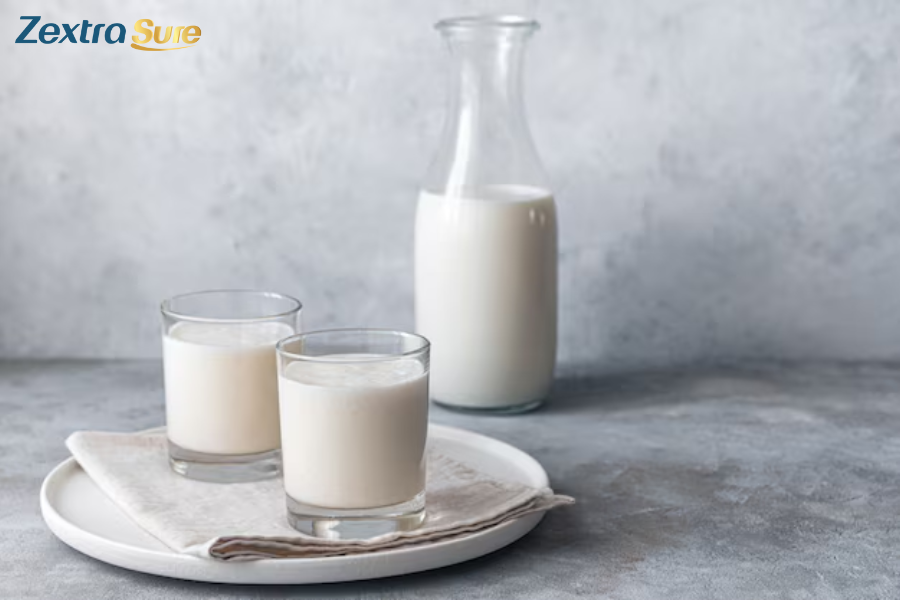Does milk have iron? Exploring the truth

When it comes to maintaining a healthy diet, milk is often considered a staple beverage due to its rich nutritional content. However, one of the most commonly asked questions when it comes to milk's health benefits is: Does milk have iron? This article will explore whether milk contains iron and how to ensure adequate iron intake in your diet.
1. What is iron and why is it important?
Before answering the question Does milk have iron? It's important to understand why iron is an essential mineral in the body. Iron plays a critical role in the production of hemoglobin, a protein in red blood cells that carries oxygen from the lungs to the rest of the body. It’s also vital for energy production and immune system function.
Iron comes in two forms:
- Heme iron: This type of iron is found in animal products such as meat, poultry, and fish, and is more easily absorbed by the body.
- Non-heme iron: Non-heme iron is found in plant-based foods such as lentils, beans, and spinach. This type of iron is not absorbed as efficiently as heme iron but is still an important part of a healthy diet.
Iron deficiency can lead to anemia, which can cause weakness, fatigue, and difficulty concentrating. For this reason, ensuring that you get enough iron in your diet is crucial, especially for people who are at risk of deficiency, such as pregnant women, children, and those on a vegetarian or vegan diet.
.png)
Iron is a mineral that’s necessary for life
So, Does milk have iron? Let's dive deeper into the nutritional content of milk to answer this question.
2. Does milk have iron?
The answer to the question “Does milk have iron” is no. Milk, especially cow's milk, contains very small amounts of iron. A standard 1-cup (244 g) serving of whole milk contains about 0.1 mg of iron (according to USDA). While this is a trace amount, it is nowhere near enough to contribute significantly to your daily iron intake.
Despite being an excellent source of calcium, vitamin D, and protein, milk does not provide a substantial amount of iron compared to other iron-rich foods. For those wondering What milk has the most iron, it’s important to note that milk is generally not recommended as a primary iron source for individuals at risk of deficiency.
So, Does milk have high iron? As we mentioned, milk is not a good source of iron. The small amount of iron it contains is not sufficient to meet the daily recommended intake. For adults, the recommended daily allowance (RDA) for iron is about 8-18 mg, depending on age and gender. A cup of milk contains only 0.1 mg of iron, so this is a clear answer to the question “Does milk have a lot of iron?”.

Does milk have iron?
Read more:
3. How to get enough iron in your diet
The question “Does milk have iron” is no. Because milk is a poor source of iron, it’s important to explore other food options to ensure that you meet your daily iron requirements.
Incorporate iron-rich foods into your diet
To ensure you’re getting enough iron, focus on including the following iron-rich foods in your meals:
.png)
Iron is found in red meat, as well as in beans and nuts
- Red Meat: Beef, lamb, and pork are all excellent sources of heme iron, which is more easily absorbed by the body.
- Poultry and Fish: Chicken, turkey, and fish like tuna and salmon are also good sources of heme iron.
- Legumes and Beans: Lentils, chickpeas, black beans, and kidney beans are high in non-heme iron, which is still a valuable source of iron, though not as readily absorbed as heme iron.
- Leafy Greens: Spinach, kale, and Swiss chard are great sources of non-heme iron.
- Fortified Cereals: Many breakfast cereals are fortified with iron, providing a good alternative for individuals looking to increase their iron intake.
Enhance iron absorption
To maximize iron absorption, it’s important to pair iron-rich foods with foods that help the body absorb iron. Vitamin C plays a crucial role in enhancing the absorption of non-heme iron. For example, pairing a spinach salad with oranges or bell peppers can significantly improve the amount of iron your body absorbs from plant-based sources.
Iron supplements
In some cases, it may be necessary to take iron supplements, especially if you have been diagnosed with iron deficiency anemia. Iron supplements come in various forms, including ferrous sulfate, ferrous gluconate, and ferrous fumarate, and they can help increase iron levels in the body.
.png)
Your doctor may suggest or prescribe different types of iron supplements
Because excessive iron intake can have negative health effects, such as gastric upset, constipation, abdominal pain, and nausea, it’s essential to consult with a healthcare professional before starting iron supplements.
Zextrasure’s article answers the question: Does milk have iron? Milk contains small amounts of iron and it is not a significant source of this important nutrient. If you’re looking to increase iron intake, it’s essential to consider other foods that are rich in iron, such as red meat, poultry, legumes, and leafy greens.
Related Articles
- Experts answer: Can you refreeze breast milk?
- Unlocking secret: Does almond milk need to be refrigerated?
- Unsweetened Oat Milk: Top 5 choices you should try!
- Top 4 best milk for weight loss: Healthier alternatives for your diet
- How to froth milk without a frother: 4 easy and effective ways
- How to make sour milk at home in just 5 minutes








